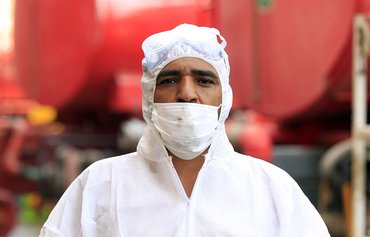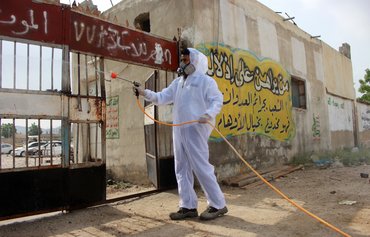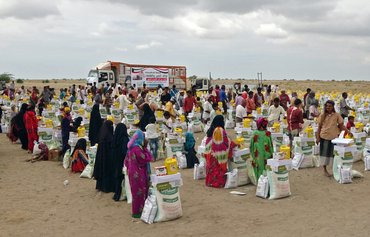UN special envoy for Yemen Martin Griffiths said Thursday (April 16th) that "very good progress" was being made towards a Yemen ceasefire.
But military activities regrettably "continue on a number of fronts" during the novel coronavirus (COVID-19) pandemic, he said, stressing that Yemen cannot fight a war and a global health crisis at the same time.
Griffiths told the UN Security Council that work was under way in "reaching consensus" over ceasefire and political dialogue proposals submitted Friday.
"We are redoubling our efforts to bridge the outstanding differences between the parties," he said, but added that he feared fighting would continue on the ground until agreement was reached on the proposals.
The city of Marib "remains the centre of gravity of this war", he said.
Meanwhile, a ceasefire implemented in early 2019 for al-Hodeidah is violated "on a daily basis", he added.
UN under-secretary general for humanitarian affairs Mark Lowcock warned that "more than one million people could suddenly be on the move", if conflict expands in Marib.
"In the first quarter of this year, civilian casualties have risen every month, with more than 500 people killed or injured," he said. "One in every three civilian casualties has been a child."
Both Griffiths and Lowcock told the Security Council that "Yemen cannot face two fronts at the same time: a war and a pandemic".
Yemen aid at risk
The UN helps "more than 13 million people across the country" every month, including nearly 12 million with food assistance, according to Lowcock.
UN agencies "estimate they need more than $900 million to carry them through July", he told the Security Council.
Of the UN's 41 major programmes, 31 would start closing in the coming weeks if additional funds are not secured, he said.
Lowcock also pointed to issues with humanitarian access, "which is both a requirement of international humanitarian law and essential if we are to continue assisting millions of people".
"We are working with all stakeholders to take precautions to reduce the risk of COVID-19 while maintaining life-saving assistance," he said. "These precautions are not slowing down aid operations in a major way."
"But it is regrettable that other restrictions imposed on staff and cargo movements -- mostly in the north -- continue to constrain our ability to maintain the high levels of aid that Yemenis need," he said.
"In the north, access challenges remain severe," he said, noting that although the Iran-backed Houthis (Ansarallah) have taken several steps to improve the operating environment for aid agencies, "progress is not moving fast enough".
"Restrictions in northern Yemen are so onerous that humanitarian agencies are being forced to calibrate programmes and delivery to levels where they can manage the risks associated with such a non-permissive environment," he said.
Although the Houthis have approved 13 aid projects since early March, agencies have 92 requests still pending, he noted, including 40 that have been waiting for months to get started.
"Local officials still arbitrarily refuse missions, and humanitarian staff continue to experience severe movement restrictions in the field, including in the past few days," he said.
"Staff are subjected to long delays at checkpoints, even when paperwork is in order," he added, noting that "UN international staff in some locations have been prevented from moving from field hubs to Sanaa. This is unacceptable."
There are problems in government-held areas as well, he said, including bureaucratic impediments and insecurity.
Several organisations in the south also have experienced serious challenges in implementing approved projects, he said, adding that "we appreciate the government's commitment to resolve these issues".
Precautionary health measures
Yemen's supreme national emergency committee meanwhile said 27 health isolation centres have been opened in nine government-controlled provinces as part of precautionary measures to prevent the spread of coronavirus.
Centres have been opened in al-Mahra, Hadramaut, Abyan, Lahij, Marib, Taez, Shabwa, al-Daleh and Aden provinces, with more to be opened if necessary, according to Deputy Health Minister and committee spokesman Ali al-Walidi.
The ministry will augment rapid response teams in each district of the government-controlled provinces with 16 health workers who have been trained to carry out field work, he told local media.
Eighty doctors, 120 nurses and 75 rapid response medics have been trained at emergency centres in Aden hospitals and in Lahij province, he said.
Additionally, 81 Saudi-funded ambulances provided by the World Health Organisation now have been dispatched, he said.
Al-Walidi urged Yemenis to abide by social distancing measures and the committee's instructions, including personal hygiene, noting that if it cannot be contained "the spread of the coronavirus will be catastrophic for all of us".

![Yemeni vendors look at their flood-damaged stalls following heavy rains in Sanaa on April 14th. [Mohammed Huwais/AFP]](/cnmi_am/images/2020/04/17/23599-Yemen-Sanaa-vendors-600_384.jpg)







I don't like it
Reply4 Comment(s)
We stand shoulder to shoulder with Abyan teachers in demanding the August salaries. We’re demanding our salaries for four years.
Reply4 Comment(s)
In response to al-Hawiyya Channel about the agricultural wells. God Almighty says, “… so traverse ye through its tracts and enjoy of the Sustenance which He furnishes.” We have to extract the wealth of the earth so all the people can benefit from it. It’s not to be monopolised by certain people. If a man digs a well and he has like 100 labana (a measurement unit), but around him, there are 3,000 labana that need water to be cultivated, is this a reason to prevent others from digging a well to water their land? Whoever supports that is a backer of foreign economic colonisation of the country and a violator of the Holy Quran. The earth is bequeathed to generations, and therefore, those generations can’t just wait until the well owner backfills his well. The channel, therefore, must stop its support to foreign aggression. Thanks.
Reply4 Comment(s)
The UN alleges that it provides food assistance to more than 13 million Yemenis a month. If that number is true … they just give soap and say the assistance has been provided. As to relief, it’s equal to food provided to the army, and if that was true, a soldier would receive a quarter chicken, 5 loaves of bread, rice, salad, cooked food and a can of beans a day. "If we assume the soldier ate more than 1 billion [sth] per day, and if we add up all that he gets per month, we could buy around 5 million bags of [sth]. We don’t need organisations or the UN. This covers only the food budget, but where are the salaries? Where are the of oil, diesel and gas differences? This shouldn’t be the case; if we make my own grandmother rule, she would rule in a better way. Greetings from the free people of Yemen. Abu Alaa Adin.
Reply4 Comment(s)